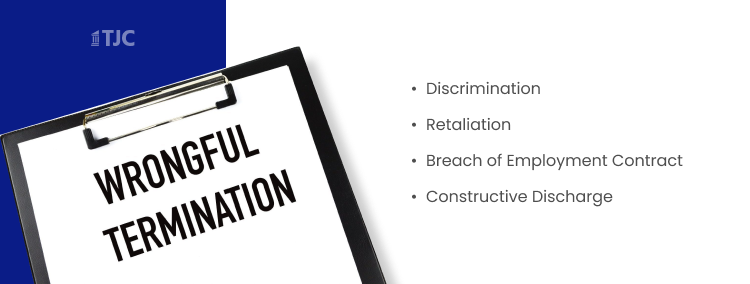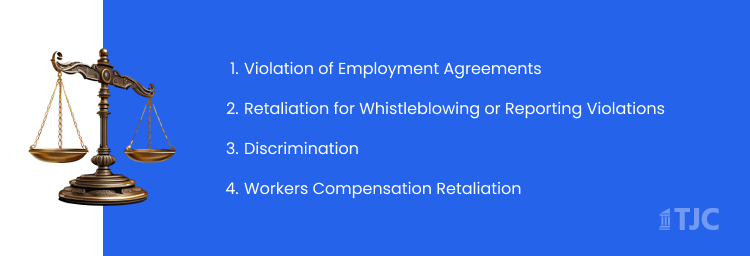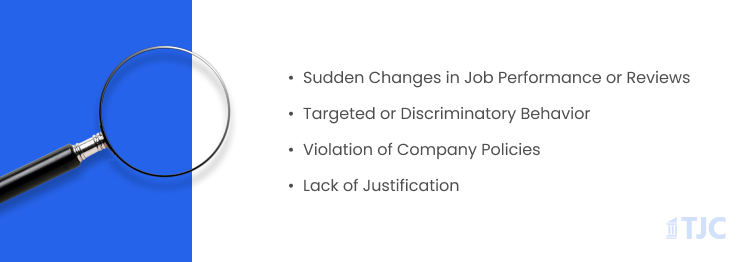A wrongful termination lawsuit arises when an employee is fired for violating employment laws. Knowing your rights helps protect you from unfair treatment and ensures you take the proper steps if you believe you’ve been wrongfully terminated.
Familiarizing yourself with the specific laws in your state is key to making informed decisions. Be sure to read until the end for a comprehensive overview of wrongful termination laws in each state to better understand your legal options.
What is Wrongful Termination?

Wrongful termination occurs when an employee is fired, violating employment law or their employment contract. It is not enough for an employee to simply be unhappy with their job or the circumstances of their firing.
Take Note: For a termination to be considered wrongful, it must be based on illegal reasons or actions that contravene federal, state, or company policies.
Wrongful Termination Key Scenarios
Discrimination
One of the most common grounds for wrongful termination is discrimination, which is illegal under federal law (such as Title VII of the Civil Rights Act of 1964).
It’s unlawful to terminate an employee based on protected characteristics such as:
- Race
- Color
- Religion
- Sex
- National origin
- Age (40 or older)
- Disability
- Sexual orientation
- Other protected categories.
Discriminatory firing violates employee rights and may lead to legal action.
Retaliation
Employers are prohibited from firing employees in retaliation for participating in legally protected activities. These include whistleblowing (reporting illegal activities), filing a workers’ compensation claim, or participating in an investigation related to employment law violations.
If an employer fires an employee for any of these reasons, it could be liable for wrongful termination.
Breach of Employment Contract
If your employment contract outlines the terms of your job, including safeguards against termination without cause, and your employer fires you in violation of those terms, it may constitute wrongful termination.
Implied contracts (not explicitly written but established by company policies or verbal agreements) may also provide protections against arbitrary firing.
Constructive Discharge
Constructive discharge occurs when an employer creates such unbearable working conditions that an employee feels forced to resign.
This could include harassment, drastic changes to job duties, or unsafe working conditions. Although the employee resigns, the employer is still considered to have effectively fired them under the law.
Wrongful Termination Legal Basis
Understanding the legal framework for wrongful termination is critical to determining whether your firing was unlawful. Different laws govern the relationship between employees and employers, depending on the nature of the termination. The primary legal justifications include:
Violation of Employment Agreements
Employment contracts outline the terms and conditions of an employee’s job. These contracts may contain clauses that limit an employer’s ability to terminate an employee without cause or outside of certain specified conditions. An employer violating these terms can lead to a wrongful termination lawsuit.
Retaliation for Whistleblowing or Reporting Violations
Employers cannot legally fire employees for reporting illegal activity or unsafe working conditions. Whistleblower protections under federal law (such as the Sarbanes-Oxley Act) make it clear that employees who report corporate wrongdoing cannot be fired as a result of their actions.
Discrimination
Under Title VII and other federal laws, employers are unlawfully prohibited from firing employees based on their national origin, race, sex, age, disability, or religion. Many states have additional anti-discrimination laws that provide further protections.
For example, California’s Fair Employment and Housing Act (FEHA) offers broader protections than federal law in some areas.
If you believe your termination was due to discrimination, you may have the right to file a complaint with the Equal Employment Opportunity Commission (EEOC) and potentially take legal action.
Workers Compensation Retaliation
Firing someone after they file a workers compensation claim is illegal. Employers cannot terminate employees who are injured on the job and seek compensation for their medical bills and lost wages.
Filing for workers compensation is a right under state law, and retaliation for doing so is punishable.
Signs You May Have a Wrongful Termination Case
Here are some red flags to look for:
Sudden Changes in Job Performance or Reviews
If you have consistently received positive performance reviews, and suddenly your employer cites poor performance as the reason for your firing.
This act could indicate wrongful termination, especially if no evidence supports claims of poor performance or if similar behavior was tolerated previously. You may need legal representation to combat this invalid claim by your employer.
Targeted or Discriminatory Behavior
If you suspect that your termination was based on discriminatory reasons, such as your nationality or gender, this could be valid grounds to assert that you were wrongfully terminated. Keep track of any comments or actions by your employer that seem to suggest discrimination or bias.
Violation of Company Policies
Employers must follow the guidelines outlined in their employee handbooks or other company policies. If your employer fires you in violation of their own stated policies, such as failing to follow disciplinary procedures before termination, it could be wrongful termination.
Lack of Justification
If your employer offers no clear reason for your firing or the reasons given are inconsistent or unfounded, it could signal that the firing was for an unlawful reason, such as retaliation or discrimination.
How To File a Wrongful Termination Lawsuit
You may be entitled to pursue a wrongful termination case if you believe you have been fired for no reason. Below is an overview of the steps in filing a wrongful termination lawsuit.
1. Seek Legal Counsel
The first step in a wrongful termination case is to consult with an experienced lawyer. A legal expert specializing in employment law can help you understand whether your case has merit, explain the legal process, and guide you through the entire procedure.
2. Gather Documentation
To build a strong case, you will need to gather evidence. Important documents include your employment contract, employee handbooks, written performance reviews, and emails or letters about your termination. Evidence of any discriminatory behavior, such as emails or texts from your employer, can also help support your claim.
3. File a Complaint with the EEOC
If you believe you were illegally terminated due to discrimination, you are required to file a complaint with the Equal Employment Opportunity Commission (EEOC) before pursuing a lawsuit. The EEOC will investigate your case and may attempt to resolve the matter through alternative dispute resolution methods, such as mediation.
4. File Your Lawsuit
You can file a lawsuit once you receive your right-to-sue letter, or if your case doesn’t require EEOC involvement. Your lawyer will help you determine whether your case should be filed in state or federal court, depending on the specifics of the case and the laws that apply.
5. Settlement Negotiations
Many wrongful termination settlements are reached through negotiations between the parties involved. If your employer offers a settlement, it’s crucial to consult with your lawyer to ensure that the settlement is fair. You may also receive additional compensation for missing wages, punitive damages, and other losses.
How to Strengthen Your Case
The following tips can help strengthen your position and increase your chances of success in a wrongful termination lawsuit.
Document Everything
Compiling accurate documentation is one of the most important things you can do. Carefully document everything related to your termination. This includes:
- Emails, Messages, and Correspondence
- Performance Reviews
- Disciplinary Records
- Meeting Notes
The more detailed your documentation, the stronger your case will be. These records could serve as critical evidence of wrongful termination and help corroborate your claims.
Witness Testimony
Witness testimony can significantly strengthen your case if others observe or experience the same or similar discriminatory or retaliatory behavior. Here’s how to approach this:
- Talk to Co-Workers
- Collect Contact Information
- Formal Statements
Act Quickly
Time is a critical factor when filing a wrongful termination claim, and there are specific deadlines you must adhere to. Statutes of limitations govern these deadlines—the maximum time you can wait before taking legal action. Here are the key points to keep in mind:
- State and Federal Deadlines
- Early Action
- Consult an Attorney
How Much is a Wrongful Termination Lawsuit Worth?
Here are the key types of damages you may be entitled to:
Lost Wages
You may receive compensation for both back pay (wages lost from termination to resolution) and future wages if you cannot find comparable employment. Lost benefits, such as healthcare or retirement contributions, may also be included.
Punitive Damages
If the employer’s conduct was egregious, you might be awarded punitive damages to punish the employer and prevent future misconduct. These vary greatly depending on the severity of the employer’s actions.
Emotional Distress
If the wrongful termination caused emotional distress, such as stress or anxiety, you could be entitled to compensation for pain and suffering. Medical evidence may be required to support this claim.
Average Settlement
Wrongful termination settlements can range widely from $5,000 to $500,000 or more. In high-profile cases, settlements can even reach millions. Those who negotiated settlements received an average of $41,500, compared to $19,200 for those who accepted the first offer.
Factors that affect settlement:
- Filing a Lawsuit: Employees who filed a lawsuit were twice as likely to receive a settlement and typically received $12,000 more than those who didn’t file.
- Employer Size: Employees of larger companies (more than 100 employees) received an average settlement of $43,400, nearly double the amount for those at smaller companies.
- Attorney Fees: Lawyers typically charge a contingency fee of 30-35% of the settlement. Some may charge hourly fees between $100-$300 per hour depending on their experience and location.
Wrongful Termination Laws by State
Wrongful termination laws differ across states, with protections under both state or federal law. Below, we explore these differences and highlight key legal provisions in each state.
Please note that the following states adhere to at-will employment policies, except Montana. That means an employer may fire an employee for any reason. However, you may still have a valid claim if your lawyer determines that your wrongful termination case is strong.
- Arizona: Since Arizona is an at-will employment state, you must have a valid reason to pursue a wrongful termination case. Exceptions to being fired include terminations based on discrimination (protected by the Arizona Civil Rights Act), retaliation (under Arizona’s Whistleblower Act), or breach of contract (such as implied agreements).
- Arkansas: In Arkansas, employees are protected from termination due to discrimination (under the Arkansas Civil Rights Act), retaliation (under Arkansas Whistleblower Act), or breach of contract (including oral or implied contracts). Firing an employee to exercise legal rights is also prohibited.
- California: California operates under subjective reasoning to terminate , but discrimination (under the California Fair Employment and Housing Act), retaliation (under California Labor Code Section 1102.5), and public policy violations (such as firing for jury duty) are prohibited. In such cases, employees with written contracts may also have additional protections.
- Colorado: Colorado’s state and local regulations are subject to exceptions, including termination for discrimination (under Colorado Anti-Discrimination Act), retaliation (under Colorado Whistleblower Act), and breach of contract (like union agreements). Public policy violations, such as firing for refusing to break the law, are also prohibited under Colorado law.
- Connecticut: In Connecticut, exceptions to the at-will rule exist for discrimination (under Connecticut Fair Employment Practices Act), retaliation (for reporting violations under Connecticut Whistleblower Protection Act), and public policy violations (such as firing for jury duty or refusing unlawful acts). Breaches of contract claims are also protected.
- Florida: Florida employers may not terminate someone for discriminatory reasons (under Florida Civil Rights Act), retaliation (under Florida Whistleblower Act), or violation of public policy (e.g., firing for refusing illegal actions). Breach of contract claims may also provide protection.
- Georgia: Georgia legislation disallows discriminatory firings (under the Georgia Fair Employment Practices Act), retaliation (for whistleblowing under the Georgia Whistleblower Protection Act), and violations of public policy (such as firing for jury duty) as reasons for termination. Breach of employment contracts may also provide an exception.
- Hawaii: In Hawaii, wrongful termination is prohibited if the firing is based on discrimination (under Hawaii Employment Practices Law), retaliation (for reporting illegal activities under the Hawaii Whistleblower Protection Act), or if it violates public policy (e.g., refusing illegal activities).
- Idaho: Idaho allows employers to terminate employees for any reason unless the termination violates discrimination laws (under Idaho Human Rights Act), retaliation laws (under Idaho’s Whistleblower Protection Act), or public policy (such as firing for jury duty).
- Illinois: Illinois adopts the at-will policy, but discrimination (protected under the Illinois Human Rights Act), retaliation (under the Illinois Whistleblower Act), and violations of public policy (e.g., firing for refusing illegal activities) are prohibited. Breach of contract claims can provide additional protection for employees.
- Indiana: Indiana employees are protected from discrimination (under the Indiana Civil Rights Law), retaliation (for whistleblowing under Indiana Whistleblower Protection Act), and violations of public policy (e.g., firing for jury duty). Breach of contract protections may also apply.
- Iowa: Iowa follows the at-will system, but provides exceptions for discrimination (under the Iowa Civil Rights Act), retaliation (under the Iowa Whistleblower Law), and violation of public policy (e.g., firing for refusal to engage in illegal acts). Employees may also have protection from breach of contract claims.
- Kansas: In Kansas, wrongful termination is prohibited in cases of discrimination (under the Kansas Act Against Discrimination), retaliation (for whistleblowing or reporting violations), and breach of contract (such as collective bargaining agreements). Public policy violations, like firing for jury duty, are also protected.
- Kentucky: Kentucky disallows discriminatory terminations (protected under Kentucky Civil Rights Act), retaliation (for whistleblowing under Kentucky Whistleblower Act), and violations of public policy (e.g., firing for refusing unlawful activities). Employees are also protected from breach of contract claims.
- Louisiana: Louisiana legislation states that wrongful termination is prohibited for reasons of discrimination (under Louisiana Employment Discrimination Laws), retaliation (under Louisiana Whistleblower Act), and violations of public policy (e.g., firing for refusal to break the law). Breach of contract claims may also provide additional protections.
- Maine: Maine provides exceptions for discrimination (under the Maine Human Rights Act), retaliation (for whistleblowing under the Maine Whistleblower Act), and violations of public policy (such as firing for jury duty or refusing illegal activities). Breach of contract claims may also apply.
- Maryland: Maryland employees can rely on protections against discrimination (under the Maryland Fair Employment Practices Act), retaliation (under Maryland Whistleblower Protection Act), and public policy violations (such as firing for refusal to engage in illegal acts). Additionally, contract-based claims can provide protection.
- Massachusetts: Massachusetts follows at-will regulations but provides significant protections for wrongful termination. Employees are protected from discrimination (under Massachusetts Fair Employment Practices Act), retaliation (for whistleblowing), and violations of public policy (e.g., firing for refusal to participate in illegal activities). Massachusetts also allows employees to seek breach of contract claims if they have a valid contract.
- Michigan: Michigan’s employment doctrine allows termination for any reason, but it is unlawful to fire someone for discrimination (under Michigan’s Elliott-Larsen Civil Rights Act), retaliation (under Michigan Whistleblower Protection Act), or violation of public policy (such as firing for refusal to break the law). Breach of contract may provide additional protection.
- Minnesota: Minnesota employees are protected from discriminatory firing (under the Minnesota Human Rights Act), retaliation (under Minnesota Whistleblower Protection Act), and violations of public policy (such as firing for refusing unlawful acts). Breach of contract claims may also protect employees.
- Mississippi: Mississippi allows for wrongful termination claims to be filed for discrimination (under Mississippi Human Rights Act), retaliation (under Mississippi Whistleblower Protection Act), and violations of public policy (e.g., firing for refusing to break the law). Breach of contract protections may apply in some cases.
- Missouri: Missouri termination exceptions exist for discrimination (under Missouri Human Rights Act), retaliation (for reporting violations under Missouri Whistleblower Protection Act), and violation of public policy (such as firing for jury duty). Breach of contract claims can also apply for protection.
- Montana: Montana is unique as it has just-cause employment laws for employees who have worked for an employer for more than 6 months. Montana’s wrongful termination laws cover discrimination (under the Montana Human Rights Act), retaliation, and public policy violations. Employees in Montana have stronger protections compared to other states.
- Nebraska: Nebraska does not allow termination as a result of discrimination (under Nebraska Fair Employment Practices Act), retaliation (for whistleblowing), and violations of public policy (such as firing for refusing to perform illegal acts). Breach of contract claims may also offer additional protection.
- Nevada: Nevada prohibits discriminatory terminations (under the Nevada Fair Employment Practices Act), retaliation (for whistleblowing under Nevada’s Whistleblower Protection Act), and violations of public policy (such as firing for refusing to break the law). Breach of contract claims may also provide protection.
- New Hampshire: In New Hampshire, wrongful termination can occur if an employee is fired for discrimination (under New Hampshire Law Against Discrimination), retaliation (for whistleblowing), or public policy violations (such as firing for refusal to participate in illegal acts). Breach of contract protections may also apply.
- New Jersey: New Jersey offers protections against discriminatory firings (under New Jersey Law Against Discrimination), retaliation (under New Jersey’s Conscientious Employee Protection Act), and violations of public policy (e.g., firing for reporting illegal activities). Breach of contract protections may also apply.
- New Mexico: New Mexico employees receive protection from discriminatory terminations (under the New Mexico Human Rights Act), retaliation (for whistleblowing under the New Mexico Whistleblower Protection Act), and violations of public policy (such as firing for refusal to engage in illegal activities). Breach of contract claims may also apply.
- New York: You can file a wrongful termination case in New York, despite it being an at-will state. Wrongful termination claims can be filed for discrimination (under the New York State Human Rights Law), retaliation (for reporting misconduct under the New York Whistleblower Protection Act), and violation of public policy (e.g., firing for refusing illegal activities). Breach of contract offers additional protection.
- North Carolina: North Carolina provides protection for employees against discriminatory firings (under North Human Relations Act), retaliation (for whistleblowing under North Carolina Whistleblower Protection Act), and violations of public policy (such as firing for refusing to break the law). Employees can also claim breach of contract protections.
- North Dakota: North Dakota follows at-will employment, with exceptions for discrimination (under North Dakota Human Rights Act), retaliation (for whistleblowing), and violations of public policy (e.g., firing for jury duty). Employees may also have protection under breach of contract claims if they exist.
- Ohio: Ohio protects employees from discrimination (under Ohio Civil Rights Commission), retaliation (for whistleblowing under Ohio Whistleblower Protection Act), and violations of public policy (e.g., firing for refusing to break the law). Employees can also pursue breach of contract claims.
- Oklahoma: In Oklahoma, exceptions exist for discriminatory firings (under the Oklahoma Anti-Discrimination Act), retaliation (under Oklahoma Whistleblower Act), and violations of public policy (such as firing for refusal to participate in illegal activities). Breach of contract protections can also apply.
- Oregon: Oregon offers employment protection against discrimination (under Oregon’s Fair Employment Practices Act), retaliation (for whistleblowing under Oregon Whistleblower Protection Act), and violations of public policy (such as firing for refusing to commit illegal acts). Breach of contract claims may also offer protection.
- South Carolina: South Carolina allows for wrongful termination claims in instances of discrimination (under the South Carolina Human Affairs Law), retaliation (for whistleblowing under the South Carolina Whistleblower Protection Act), and violations of public policy (e.g., firing for refusing illegal acts). Employees may also have contractual protections in some cases.
- South Dakota: South Dakota provides exceptions for termination if the reasons are based on discrimination (under South Dakota Human Rights Act), retaliation (for whistleblowing under the South Dakota Whistleblower Protection Act), and violations of public policy (such as firing for refusing illegal acts). Breach of contract claims can also be pursued.
- Virginia: In Virginia, wrongful termination can occur if an employee is fired for discriminatory reasons (under Virginia Human Rights Act), retaliation (under Virginia Whistleblower Protection Act), or violation of public policy (such as firing for refusing to engage in illegal conduct). Breach of contract protections may apply in some cases.
- Washington: Washington law states that wrongful termination claims can be made based on discrimination (under the Washington Law Against Discrimination), retaliation (for whistleblowing under the Washington Whistleblower Act), and violations of public policy (e.g., firing for refusing to break the law). Employees may also file for breach of contract in certain cases.
- West Virginia: West Virginia employees can file wrongful termination claims for discrimination (under West Virginia Human Rights Act), retaliation (for whistleblowing under the West Virginia Whistleblower Protection Act), and violations of public policy (such as being fired for refusing illegal activities). Breach of contract claims may also be applicable in some cases.
- Wisconsin: Wisconsin follows at-will, but wrongful termination can occur if an employee is fired due to discriminatory reasons (under Wisconsin Fair Employment Act), retaliation (for reporting misconduct under Wisconsin Whistleblower Protection Act), or violations of public policy (such as firing for refusing to break the law). Breach of contract claims may provide additional protection.
- Wyoming: Wyoming employment is subject to exceptions for at-will termination if you’re let go based on discrimination (under Wyoming Fair Employment Practices Act), retaliation (for whistleblowing), and violations of public policy (e.g., firing for refusing to break the law). Breach of contract can also offer some protection for employees in specific cases.
Wrongful Termination Lawsuits FAQs
How Long Do I Have To File A Wrongful Termination Claim?
In general, you have 180 to 300 days to file with the Equal Employment Opportunity Commission or a state agency. However, the time frame for filing a lawsuit in court may vary, typically within 1 to 3 years from the termination date.
Can I Afford A Lawyer For My Case?
A wrongful termination lawyer will work on a contingency fee basis, meaning they only receive payment if you win your case. This makes legal services accessible to individuals who may not have the financial resources to pay hourly fees.
Can I File A Lawsuit If My Employer Fired Me Because He/She Does Not Like Me?
In at-will employment states, employers can terminate employees for almost any reason, including personal dislike, as long as the termination doesn’t violate federal law (e.g., discrimination or retaliation). However, you may still have a case if the firing was based on illegal grounds.
Conclusion
You cannot be wrongfully terminated from your place of employment. Being in such a position is challenging, but with the right knowledge and legal support, you can take steps to protect your rights and seek compensation. Your case may involve discrimination, retaliation, or a breach of contract.
It’s important to understand the legal frameworks that apply to your situation. Consulting with a qualified wrongful termination lawyer is crucial to securing justice.
If you believe you’ve been wrongfully terminated, don’t hesitate to reach out to a reputable law firm with experience in employment law.
Disclaimer: The information provided in this article is for informational purposes only and does not constitute legal advice. Readers should consult with a licensed attorney for legal guidance regarding their specific situation. The content is not intended to create, and receipt of it does not constitute an attorney-client relationship.



